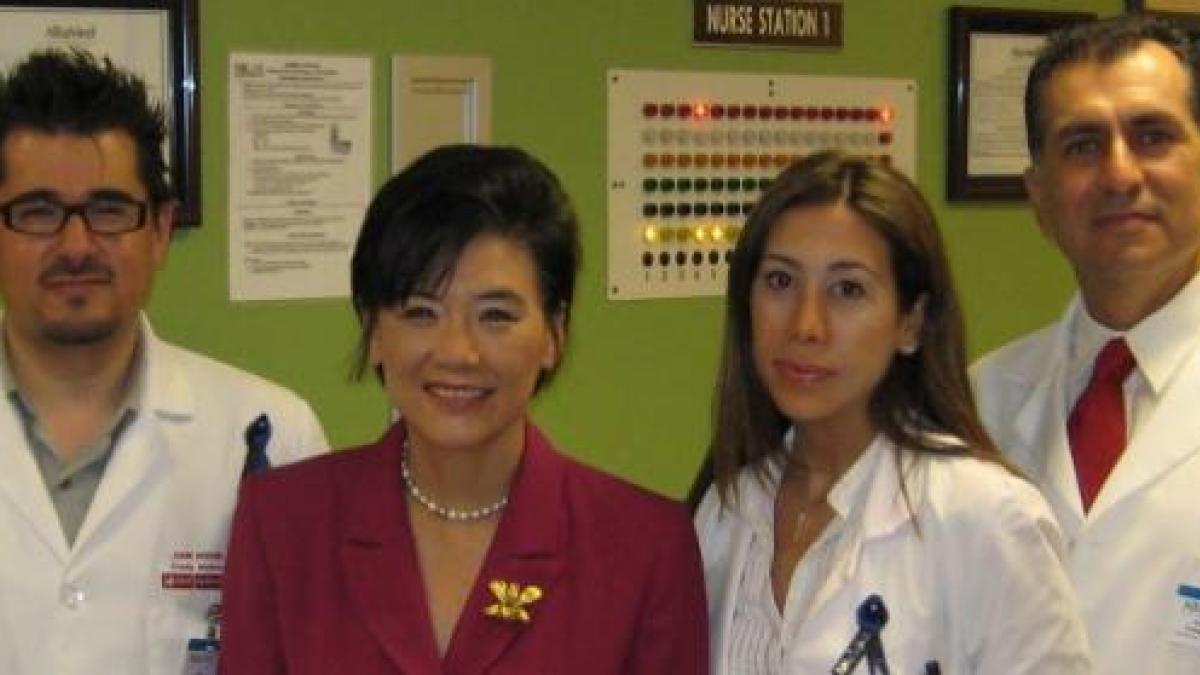Health Care

Rep. Chu with health care staff at AltaMed Health Services in El Monte, California.
Healthcare should be affordable and accessible for all. That means nobody should be denied life-saving treatments because of preexisting conditions, nor should anybody have to choose between paying for medicine or paying their bills. As a Member of the House Ways and Means Committee and its Health Subcommittee, I am committed to working to protect and expand the Affordable Care Act (ACA), as well as protecting the Medicare program so we can ensure our seniors have quality care they can count on.
The ACA made considerable improvements to our nation's healthcare system, which includes putting in place protections for people with pre-existing conditions, preventing health plans from charging women more than men, and requiring that all health plans cover a minimum set of Essential Health Benefits, like hospital visits and prescription drugs. Instead of attacking the ACA as Republicans have since it was passed, Congress should be working together to improve the system we have, like continuing to invest in public health and expanding Medicaid.
I also believe we should be doing more to address the underlying costs of healthcare, like the skyrocketing prices of prescription drugs, which is why I was proud to vote in favor of the Inflation Reduction Act. This landmark legislation lowers the cost of prescription drugs for seniors by finally allowing Medicare to negotiate for the price of prescription drugs—something I have been fighting for in Congress for years. It also ensures that Medicare beneficiaries do not pay more than $2,000 per year on prescription drugs, and limits out-of-pocket spending on insulin to no more than $35 per month. It also extends subsidies for working class families to afford health insurance through the ACA so that no one has to choose between having lifesaving health insurance and putting food on the table.
Finally, I believe we should be looking forward in healthcare, not backwards. That is why I am one of the founding members of the Medicare for All Caucus. The purpose of this Caucus is to begin discussions about how to improve and expand healthcare coverage for everyone in our country.
Additionally, one of my top priorities in Congress is to ensure equal access to healthcare, no matter your race, background, or zip code. Every Congress, members of the Congressional Asian Pacific American Caucus (CAPAC), the Congressional Hispanic Caucus (CHC), and the Congressional Black Caucus (CBC), collectively known as the Tri-Caucus, introduce the Health Equity and Accountability Act (HEAA). This bill is focused on eliminating health disparities in minority populations and ensuring that healthcare is not out of reach for anyone. As Chair of CAPAC, I help to lead the introduction of this each Congress.
If you are looking to enroll in health insurance, our state's exchange is called Covered California. Open enrollment is through November-January; check Covered California for specific dates. Purchasers may be eligible for subsidies to help cover the costs of the premiums. To learn more, visit www.coveredca.com or call 1-888-975-1142. Paper applications are also available in Chinese, Spanish, Vietnamese, and other languages here: (https://www.coveredca.com/apply/).
Substance Abuse and Mental Health
I am the only psychologist currently serving in Congress, so I know how critical it is to remove barriers to seeking mental health care, especially for our underserved community members who feel lonely and isolated. Even before the pandemic, we have known that the stigma attached to mental health is an issue in the Asian American, Native Hawaiian, and Pacific Islander (AANHPI) community. That is why I have introduced the Stop Mental Health Stigma in Our Communities Act in every Congress since 2016.
This bill instructs the Department of Health and Human Services’ (HHS) Substance Abuse and Mental Health Services Administration (SAMHSA) to provide outreach and education strategies for the AANHPI community by partnering with local advocacy and behavioral health organizations that have an established record of serving AANHPIs. The legislation would also ensure that AANHPI community members themselves are involved in the development and implementation of these strategies. By working with trusted community organizations to provide culturally and linguistically appropriate outreach and education, this bill would help break down the stigma associated with mental health conditions and substance use disorders.
I am also deeply concerned about the impact the opioid crisis and addiction have on our community, and every community across the country. I believe that we need to focus on all aspects of this crisis: prevention, treatment, and recovery. To prevent more individuals from becoming addicted, I am committed to helping patients access non-addictive alternatives to opioids to treat pain. I have worked to pass bills that would expand treatment options for those suffering from addiction, including those in the senior population. Finally, I believe we need to ensure that those in recovery have a safe and supportive environment to rebuild their lives. Rest assured that I am working on all of these issues in my role in Congress.